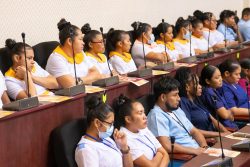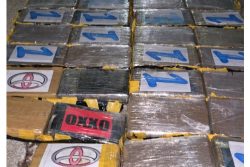Regulatory bodies continue to be under pressure to show that they are performing their very important functions and not giving the PPP/C government and their cronies a free pass.
The Public Procurement Commission (PPC) is one of these under intense scrutiny and thus far it has failed to convince the public that it is discharging its constitutionally inscribed functions. The PPC was fully constituted in July last year with attorney at law Pauline Chase being named as its Chair. Since then it has not taken up any known serious matter as it relates to the detailed obligations set out clearly in the Constitution. Instead it has embarked on outreaches and meetings which appear to be part of stalling tactics. To compound matters it is now bizarrely seeking a legal opinion as to whether it can perform functions that were undertaken by the previous PPC. Astounding.
After coming under attack from APNU+AFC MP and former Minister of Public Works, David Patterson – who himself had been the subject of an investigation by the PPC following a complaint by then opposition MP Gail Teixeira – the PPC on Friday issued a lame response.
It affirmed that it is yet to act on any of the complaints submitted to it by Mr Patterson. The PPC’s CEO Michael Singh said in a statement: “As previously stated by the Commission by way of public statement issued on 24th April, 2023, the matters which Mr. Patterson have raised with the commission are under active consideration and are awaiting legal advice, the particulars of which Mr. Patterson continues to misrepresent in the public domain. The commission, as is any citizen of the Co-operative Republic of Guyana, is entitled to seek legal advice as it has so done and is perplexed by the apparent contention as made in the said article, that it is not entitled to do so and is derelict by so doing”.
Mr Singh’s response is disappointing when one considers the valuable time that has been frittered away by the PPC in addressing the major issues that are before it. Mr Patterson has advanced a number of complaints that are already in the public domain:
– Eight contracts awarded to V. Dalip Enterprise, by the Regional Democratic Council, Region #9, totalling $106.8M. This contractor had been debarred by the PPC in November 2019 until December 2030. These awards were also flagged in the Auditor General’s report of 2021.
– A contract awarded to V. Dalip Enterprise for the four-lane Highway from Eccles to Great Diamond, by the Central Housing and Planning Authority, totalling $890M, this Contractor as mentioned before was previously debarred by the PPC.
– A contract awarded to St8ment Investment Inc. for the construction of the Bamia/Amelia’s Ward Primary School by the Ministry of Local Government and Regional Development. Mr Patterson said that public records showed that this company was established only eight months prior to the award, bringing into question if the company would have met the technical criteria as set out in the National Procurement and Tender Administration Board’s Standard Bidding Documents.
There are other questionable procurements that have since arisen including the electronic identification contract with a German firm concluded by virtual signing with a yet unspecified role for the United Arab Emirates. Given its glacial pace it is unclear whether the PPC will ever get around to taking up these matters despite its wide powers and the bipartisan approval for its composition and mandate.
One wonders whether the APNU+AFC can apply itself to successfully raising in Parliament the matter of the PPC’s outlook.
Then there is the Integrity Commission. It was fully constituted on May 31st, 2022 after the life of the previous commission expired on February 21, 2021. Whereas the statutory declarations for 2022 were originally due on August 31, 2022, an overly generous extension to December 31, 2022 was granted by the Commission. There was no public word about the fate of the statutory declarations for the four-plus months this year until yesterday.
In the state-owned Guyana Chronicle, the Integrity Commission disclosed in an advertisement that despite the long extension that had been granted, 828 declarations were still outstanding. This is the highest number of delinquencies over the last five years for 2022. Where Members of Parliament are concerned, 17 are still to submit, 104 from ministries and a shocking 493 from agencies and departments. Despite this serious level of non-compliance, no substantial action has yet been taken.
The Integrity Commission said in the advertisement that it is now preparing to take the next step in the process as set out in accordance with its governing Act. The next step is that the defaulters will see their names published in the press and the Official Gazette. “The final step, if declarations are still not received would be seek to prosecution of the defaulter”, the advertisement said. It is unclear when such a step might be taken.
In the advertisement, the Integrity Commission also disclosed a programme similar to the PPC’s and which raises questions about whether it has its priorities in the right order. It says its Chairperson Chandra Gajraj has been holding monthly statutory meetings and “hosting informal meetings with persons in public life”. It is unclear why the chair would be holding informal meetings when formal sessions and compliance with the Act should be the primary focus. The Commission’s staff has also “spearheaded over 20 informal meetings at public offices to discuss matters related to the work of the Commission” and has also undertaken public outreaches with “Specified Officers and has completed 11 such outreaches from November 2022 to January 25, 2023”.
While stating that compliance remains a great concern and challenge, the Integrity Commission said that it has made over 40 recommendations through the Attorney General’s Chambers for the “modernization of the 1997 Integrity Commission Act, which continues to be an impediment to compliance”. There has been no information from the Attorney General’s Chambers on these recommendations. The Integrity Commission added that it has also sought to actively engage public officers including the Speaker and Members of the National Assembly and is in consultation with “external partners to conduct a thorough risk assessment of its systems and processes in order to develop a digital management system that would allow for e-filing”.
There has been enough prevarication by both the Public Procurement Commission and the Integrity Commission and they must buckle down to addressing the important tasks before them.








